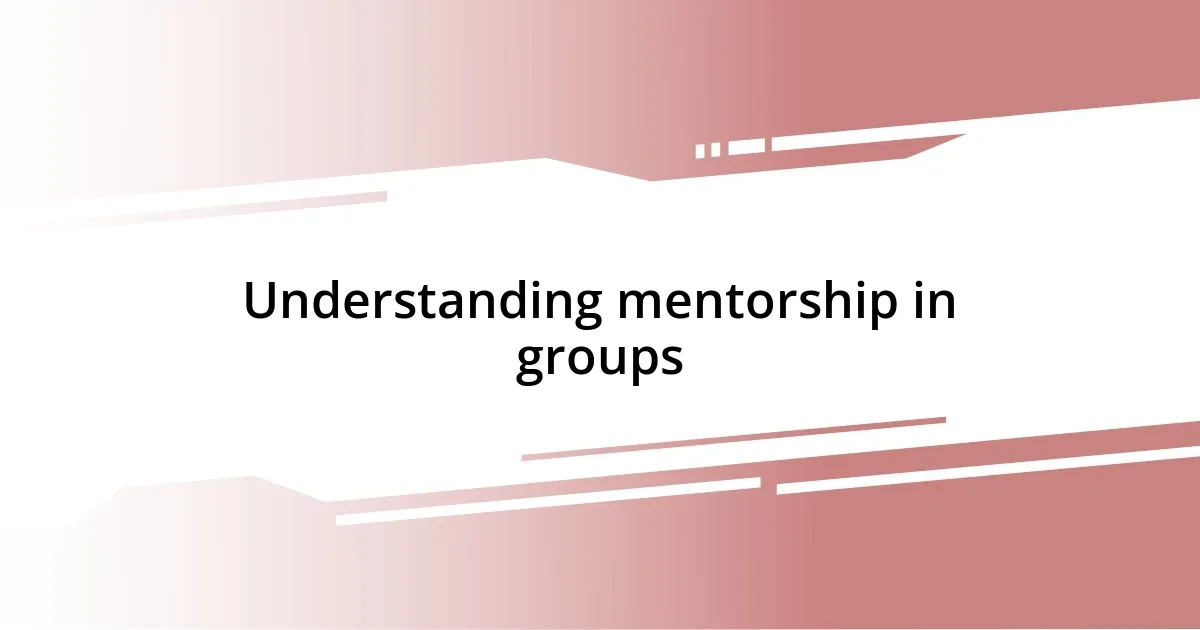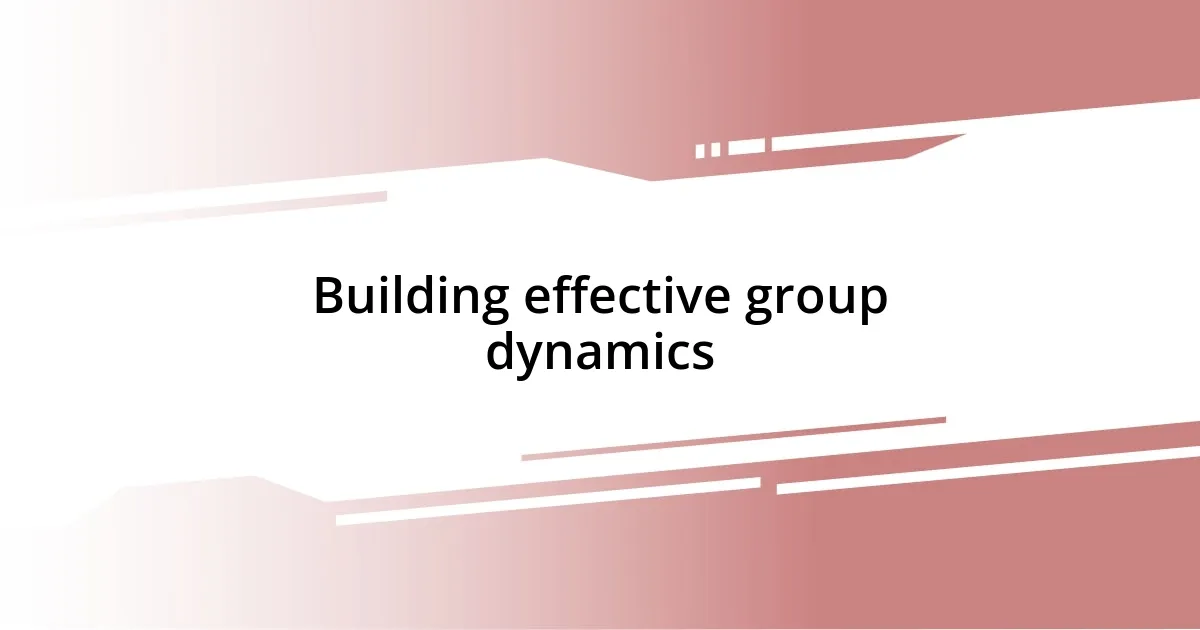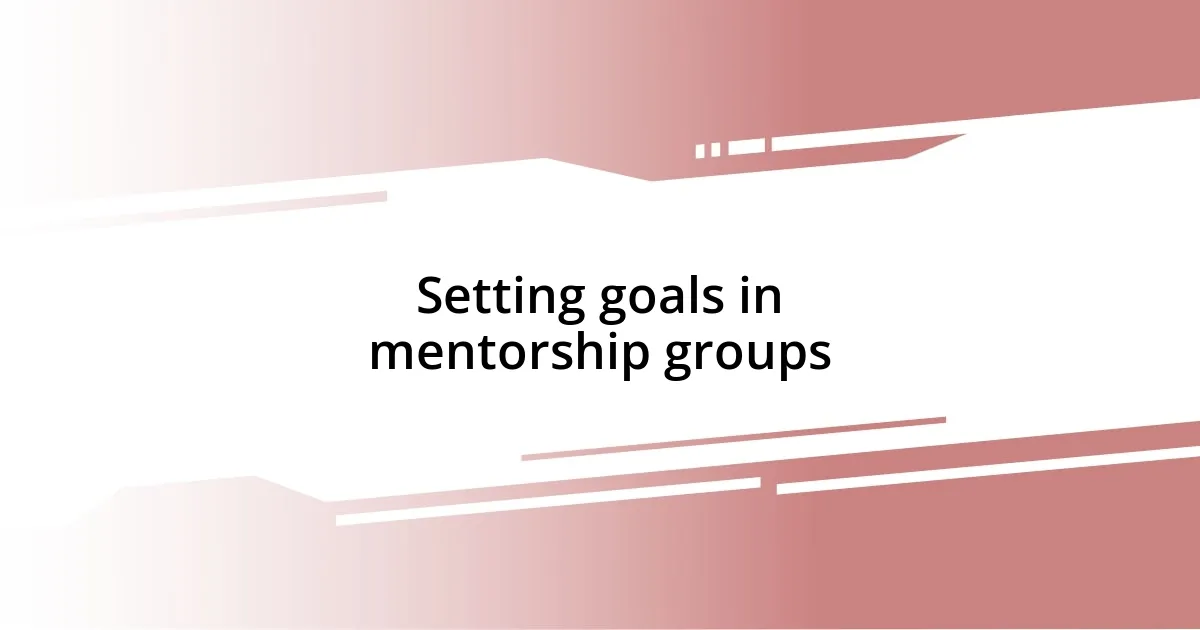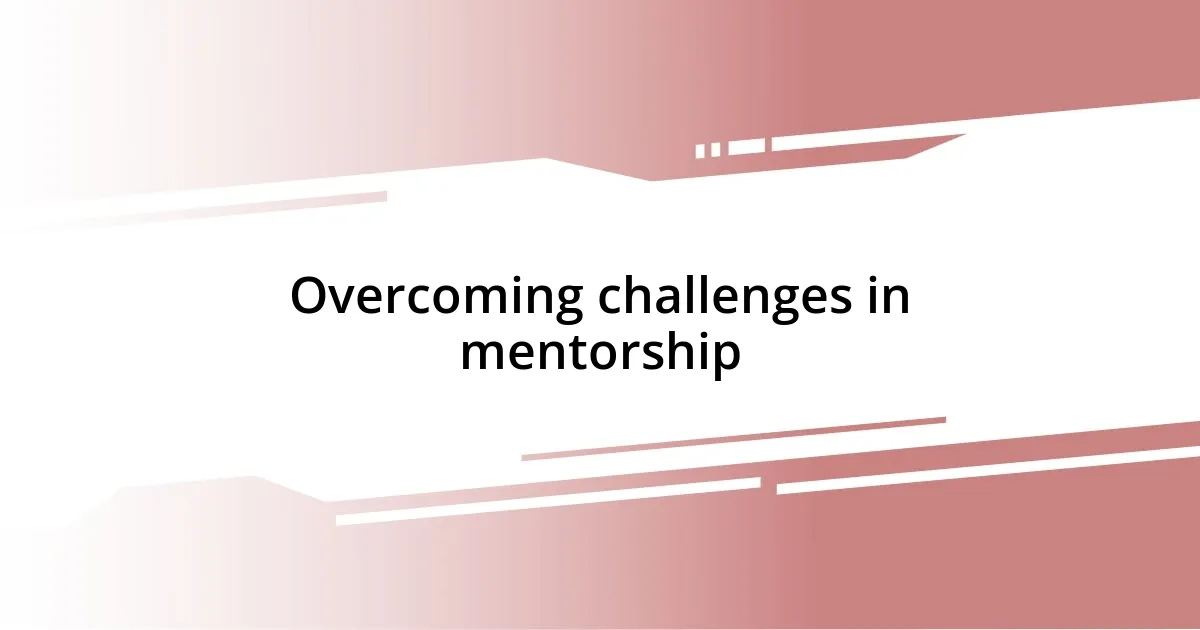Key takeaways:
- Group mentorship promotes collaborations that enhance personal growth, accountability, and a sense of community.
- Choosing the right mentor involves considering shared values, diverse backgrounds, communication styles, and passion for mentorship.
- Building effective group dynamics relies on trust, open communication, and thoughtful facilitation to foster engaging discussions.
- Evaluating mentorship success focuses not only on goal completion but also on personal development, feedback, and the lasting impact of shared experiences.

Understanding mentorship in groups
Mentorship in groups is a unique dynamic, blending guidance with collaboration. I remember my first experience in a group mentorship setting; the way the mentor encouraged us to share ideas created a sense of community. It felt liberating, knowing we could learn from each other’s strengths and struggles rather than just one person’s wisdom.
What truly struck me was how mentorship in a group can amplify personal growth. I still recall a moment when a fellow mentee bravely shared their challenges, prompting discussion that uncovered insights I hadn’t considered before. Have you ever felt that powerful rush of inspiration from someone else’s vulnerability? It’s a reminder that learning is often a shared journey.
Group mentorship also fosters a sense of accountability. When you’re part of a collective, it’s harder to slip through the cracks. I noticed that I worked harder to achieve my goals, simply because I knew others were rooting for me. How motivating is it to have a circle of support pushing you forward?

Benefits of group mentorship
Group mentorship offers a unique opportunity to harness diverse perspectives. In my experience, hearing various viewpoints during our discussions often led to richer solutions than any single mentor could provide. It’s this variety that not only broadens our understanding but also deepens our interpersonal skills as we learn to navigate different ideas and personalities.
Another significant advantage of group mentorship is the cultivation of supportive networks. I remember feeling buoyed by the camaraderie of my peers. We celebrated each other’s successes, and that positivity created an environment where risk-taking was encouraged. Isn’t it amazing how striving for individual goals becomes a collective endeavor in a supportive atmosphere?
Moreover, group mentorship can enhance the mentor’s effectiveness. I’ve noticed that when a mentor engages with multiple mentees, they refine their guidance skills and adapt to the needs of diverse learners. This dynamic not only benefits the mentor but also elevates the quality of feedback, enriching the learning experience for everyone involved.
| Benefit | Description |
|---|---|
| Diverse Perspectives | Broadens understanding through shared insights from multiple mentees. |
| Supportive Networks | Cultivates a sense of belonging, encouraging personal and collective achievements. |
| Enhanced Mentor Effectiveness | Refines mentor’s skills and adapts guidance to diverse needs. |

Finding the right mentor
Finding the right mentor can feel like searching for a needle in a haystack. I learned this firsthand when I was looking for someone to guide me in my career path. Initially, I focused solely on their credentials, but I soon realized that personal connection and compatibility were equally crucial. A mentor who understands your journey and resonates with your ambitions can make all the difference.
Here are a few aspects to consider when choosing a mentor:
- Shared Values: Look for mentors whose values align with yours. When there’s a mutual understanding of what matters, guidance feels more meaningful.
- Diverse Background: A mentor from a different background can introduce fresh ideas and perspectives. I once worked with someone whose experiences were vastly different from mine; their unique insights opened my eyes to new possibilities.
- Communication Style: Pay attention to how a potential mentor communicates. I’ve found that mentors who are open and approachable foster a more supportive learning environment.
- Passion for Mentorship: Choose someone who genuinely enjoys mentoring. I once had a mentor who was passionate about helping others grow; their enthusiasm motivated me to push beyond my limits.
- Availability: Ensure that your mentor has the time to dedicate to your growth. A busy mentor can lead to missed opportunities for guidance or feedback.
By focusing on these factors, you’ll increase your chances of finding a mentor who’s not just knowledgeable, but also a great fit for you personally.

Building effective group dynamics
Creating effective group dynamics is essential for making the most of mentorship experiences. I remember a group session where we deliberately took turns to listen without interrupting. It fostered an atmosphere of respect and encouraged everyone to share openly, leading to richer, more thoughtful discussions. Have you ever noticed how even small changes in communication can transform the energy in a group?
Trust is another cornerstone of building effective dynamics. In one of my mentorship circles, we implemented “trust exercises” where we shared personal challenges. This vulnerability not only deepened our connections but also created a safe space. It’s amazing how sharing struggles can bring a group closer together, isn’t it?
Lastly, keeping the group engaged requires thoughtful facilitation. As a mentee, I found that mentors who asked open-ended questions inspired deeper reflections. For instance, when a mentor asked, “What does success look like for you?” I was compelled to think critically and share my vision. This approach not only elevated my engagement but also encouraged others to articulate their thoughts, enriching the overall group experience.

Setting goals in mentorship groups
Setting clear goals in mentorship groups is a fundamental step that shapes the overall experience. I recall my first group session filled with excitement, but we quickly realized we needed a roadmap. When we sat down to define our individual and collective objectives, it created a shared purpose that energized our discussions. Isn’t it fascinating how a few simple words can align a diverse group towards a common vision?
One technique that worked wonders for us was adopting the SMART criteria—specific, measurable, achievable, relevant, and time-bound. I remember setting a personal goal to enhance my public speaking skills. This structure made it easier to track my progress and hold myself accountable. Have you ever felt motivated just by knowing a group is rooting for your success? That support truly amplified my commitment.
As we continued to refine our goals, celebrating small victories emerged as a vital motivational strategy. I can still remember the thrill when we recognized each member’s achievements during our monthly check-ins. This not only boosted morale but also deepened our sense of community. It’s moments like these that reinforce the power of collective growth—don’t you agree?

Overcoming challenges in mentorship
Facing challenges in mentorship can be a pivotal growth experience. Not long ago, I encountered a situation where differing perspectives in our group led to friction. I remember feeling frustrated initially, but as we navigated these differences, we learned how to appreciate each other’s viewpoints. Isn’t it interesting how conflict can actually lead to deeper understanding?
Communication breakdowns are another common hurdle. I once participated in a group where a vital discussion fell flat because a few members held back. To overcome this, we created an anonymous feedback system that allowed everyone to voice their thoughts without fear of judgment. That small change not only liberated voices but also transformed the energy of our meetings. Have you ever experienced such a shift when people feel safe to express themselves?
Ultimately, resilience is key in overcoming mentorship challenges. I learned that setbacks should be seen as learning opportunities. Like that one time when a workshop fell short of expectations; instead of dwelling on it, we decided to analyze what went wrong together. This collective problem-solving session not only strengthened our bond but also equipped us with strategies to tackle future challenges head-on. Isn’t it empowering to know that every obstacle can be a stepping stone to growth?

Evaluating mentorship success
Evaluating the success of mentorship in group settings goes beyond mere completion of goals; it’s about reflecting on personal growth and group dynamics. I distinctly remember a session where we collectively assessed our journey. The insights shared were incredibly revealing. I felt a sense of pride when others acknowledged how my guidance in brainstorming sessions sparked creativity in their projects. Have you ever experienced that rush when your contributions positively affect someone else?
Another critical aspect is the feedback loop. I vividly recall a moment when we had an open discussion about our experiences. One member pointed out how our mentorship group had helped him overcome his imposter syndrome—a feeling that can be quite crippling. This kind of honest reflection highlighted not only individual development but also the supportive environment we cultivated together. What if we embraced feedback as a gift that can guide us toward greater personal transformation?
Finally, retention of knowledge is essential in measuring mentorship success. I think back to a group member who shared that a technique I introduced for managing stress turned into her go-to strategy during critical moments at work. It brought me immense joy to see tangible benefits arising from our shared experiences. Have you ever realized that what you’re learning today shapes your tomorrow? These powerful moments reinforce why mentorship is not just about achieving goals but about building lasting connections and skills that resonate long after the group ends.














